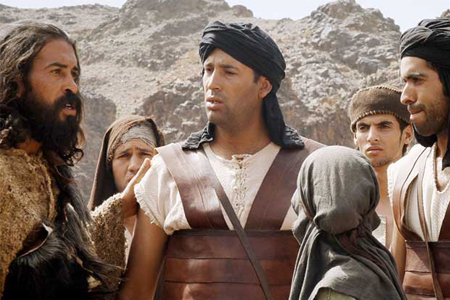When all the people asked John. ‘What must we do?’ he answered, ‘If anyone has two tunics he must share with the man who has none, and the one with something to eat must do the same.’ There were tax collectors too who came for baptism, and these said to him, ‘Master, what must we do?’ He said to them, ‘Exact no more than your rate.’ Some soldiers asked him in their turn, ‘What about us? What must we do?’ He said to them, ‘No intimidation! No extortion! Be content with your pay!’
A feeling of expectancy had grown among the people, who were beginning to think that John might be the Christ, so John declared before them all, ‘I baptise you with water, but someone is coming, someone who is more powerful than I am, and I am not fit to undo the strap of his sandals; he will baptise you with the Holy Spirit and fire. His winnowing-fan is in his hand to clear his threshing-floor and to gather the wheat into his barn; but the chaff he will burn in a fire that will never go out.’ As well as this, there were many other things he said to exhort the people and to announce the Good News to them. (Luke 3:10-18)
Reflection - What must we do?
We continue to focus on John the Baptist in the Gospel today. Last week we heard about John’s ministry of preaching repentance and baptism for the forgiveness of sins. The idea of repentance is about turning around and facing in a new direction. John’s call to the people was to turn away from the old ways of life and to turn towards God.
The Gospel opens with the people, the tax collectors and some soldiers, having heard the call to change their lives, all asking John, ‘What must we do?”
These three groups would normally be very suspicious of each other. The Roman soldiers, occupying the country, the locals who collected tax on behalf of the Romans, and the crowd, often the victim of both. Yet somehow John’s preaching has brought them all together in a community of sorts.
Notice how practical John’s advice is. And, at the same time, it is a call to live by the values of compassion (to the crowd), justice (to the tax collectors), and the promotion of peace (to the soldiers).
Values and behaviours opposite to these hinder relationship with God, dehumanise others and ruin life in community.
What results from conversion is a new way of life. In the Gospel, John spells out what that new way of life might look like for these groups of people.
John’s teaching and advice build a sense of expectancy among the crowd. “Is this the One?” they ask themselves.
It would have been easy for John to get carried away with his popularity, but he proves to be a true servant of the Word (like the prophets) and directs the peoples’ attention away from himself and towards the One who is to come.
Feelings of expectation and rejoicing dominate the prayers and readings of this part of Advent as we grow closer to celebrating the Christmas feast.
Our celebration of the historical birth of Jesus is the lens through which we again contemplate the enduring presence of Jesus in our lives. Accompanied by the beautiful thoughts of the first reading we can be confident in God’s love, which (as the reading says) renews us.
How do we respond to this new awareness of God’s abiding love? We ask the same question as the people asked John, “What must I do?” Our response to that question leads to a reformation of our attitudes and behaviour towards others. To be baptised with the Holy Spirit and with fire is to be baptised ‘from within’, to have hearts and minds re-made in the image and likeness of Christ.
Learning the way of Christ is how we become the wheat in the Kingdom of God, not the chaff in the fire.
You can download and print our prayers and reflections for this Sunday.
pdf
Celebrating At Home 3rd Sunday of Advent [PDF]
default
Celebrating At Home 3rd Sunday of Advent [ePub]















